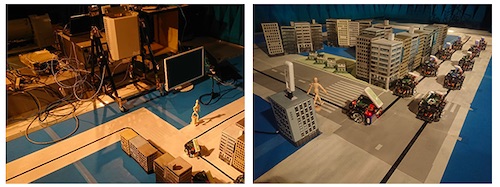|
|
|
|
|
|
| - Changing the priority of radio resource allocation according to the vehicle and surrounding conditions - |
TOKYO, Feb 21, 2019 - (JCN Newswire) - NEC Corporation (TSE: 6701) announced the successful demonstration of adaptive network control technology(1) in its MEC(2) servers and base stations that helps to improve the safety of automated driving. These trials successfully allocated radio resources (frequency bandwidth and time slots) to vehicles with high urgency as part of providing services that require real-time communication control for mobile networks.
 | | Demonstration in an anechoic chamber |
In the experiment, NEC confirmed that base stations can support safe driving by steadily suppressing communications delay time to within 100 milliseconds by preferentially assigning radio resources to vehicles with high urgency based on the analysis results of vehicle location information, camera images of the area around the road and other data.
Along with the popularization of the Internet of Things (IoT), automated driving technologies that cooperate with real-time communication control over mobile networks are being developed for various devices, such as automated driving cars, automated guided vehicles in factories and warehouses, security robots, and drones for inspection and delivery. In automated driving, where safety is of the utmost importance, a vehicle needs to be controlled more safely by sharing information, such as positions and images, between surrounding vehicles and street cameras, in real time in order to avoid collisions with people or objects that its autonomous sensing cannot detect.
However, in existing mobile networks, as the number of connected devices or the amount of communication data increases, a base station may run short of radio resources, which delays vehicle control, making smooth and safe automated driving difficult.
Based on these conditions, NEC conducted trials using its adaptive network control technology in which an LTE base station preferentially allocated radio resources to devices with high urgency in response to the requirements of a Context-aware Service Controller(CSC,(3)). The CSC is running on an MEC server and enables information to be transmitted within a communication delay time that protects safety.
Demonstration in an Anechoic Chamber
In the experiment, an automated driving environment was simulated in an anechoic chamber. The MEC server detected pedestrians by analyzing images of street cameras at an intersection, collected information on the location of surrounding vehicles, and shared such information with individual vehicles in real time. The commercial LTE base station was placed near the intersection, and multiple devices, such as vehicle models, cameras and smartphones, were connected to create a situation where there was a shortage of wireless resources.
Through cooperation between the CSC and LTE base station, radio resources were preferentially allocated to vehicles that were approaching pedestrians who were crossing intersections and subsequent vehicles to deliver warning information within the target delay of 100 milliseconds(4).
As a result of the experiment, it was confirmed that the probability that the round-trip communication delay between the vehicle and the MEC server would be within 100 milliseconds just 27% of the time with conventional technologies, but this was improved to 99% by the application of NEC's adaptive network control technology. This enables a stable delay within 100 milliseconds required for safe driving support, even in congested communication environments, and contributes to improving the reliability of automated driving by providing information on the surrounding traffic environment to vehicles in real time.
Based on the results of this demonstration test, NEC will apply this technology to various IoT services that require real-time communication control, including automated driving. Going forward, NEC will continue to develop this technology for 5G, and aim to apply it to services that require more connected devices and even lower delays.
NEC exhibits its adaptive network control technologies at Mobile World Congress 2019 held in Barcelona, Spain, from Monday, February 25, to Thursday, February 28, 2019.
This demonstration experiment includes results from research commissioned by the Ministry of Internal Affairs and Communications, "Research and Development for Expansion of Radio Resources-Research and Development of High-Efficiency Communication Methods for Mobile Phone Networks that Contain Multiple Devices."
NEC globally promotes the Social Solutions Business, which creates social value in terms of safety, security, efficiency and equality. Going forward, NEC will combine advanced ICT and knowledge to create an efficient and sophisticated society in which people can live happier and richer lives.
(1) Adaptive Network Control Technology
(2) Multi-access Edge Computing
(3) Context-aware Service Controller
(4) 3GPP (3rd Generation Partnership Project), a standardization organization for mobile networks stating that "the communication delay for safe driving support services must be within 100 milliseconds with a 95% or more probability" for automotive networks.
Contact:
NEC
Seiichiro Toda
s-toda@cj.jp.nec.com
+81-3-3798-6511
Topic: Press release summary
Source: NEC Corporation
Sectors: Telecoms, 5G, Wireless, Apps
https://www.acnnewswire.com
From the Asia Corporate News Network
Copyright © 2024 ACN Newswire. All rights reserved. A division of Asia Corporate News Network.
|
|
|
|

|
|
|
| |
| NEC Corporation Related News |
|
| 2024年4月16日 14時00分 JST |
| NEC、SBTiからNet-Zero目標の認定を取得 |
|
| Thursday, 11 April 2024, 15:10 JST |
| DOCOMO, NTT, NEC and Fujitsu Develop Top-level Sub-terahertz 6G Device Capable of Ultra-high-speed 100 Gbps Transmission |
|
| Wednesday, 10 April 2024, 13:36 JST |
| Transgene and NEC Present First Clinical Benefits of Neoantigen Cancer Vaccine, TG4050, in Head & Neck Cancer at AACR 2024 |
|
| Monday, 8 April 2024, 13:45 JST |
| NEC white paper proposes comprehensive process workflow for the application of AI-driven personalized cancer vaccines |
|
| Monday, 25 March 2024, 10:08 JST |
| NEC develops marketing strategy planning & effectiveness simulation technology using generative AI |
|
| More news >> |
|
|
|